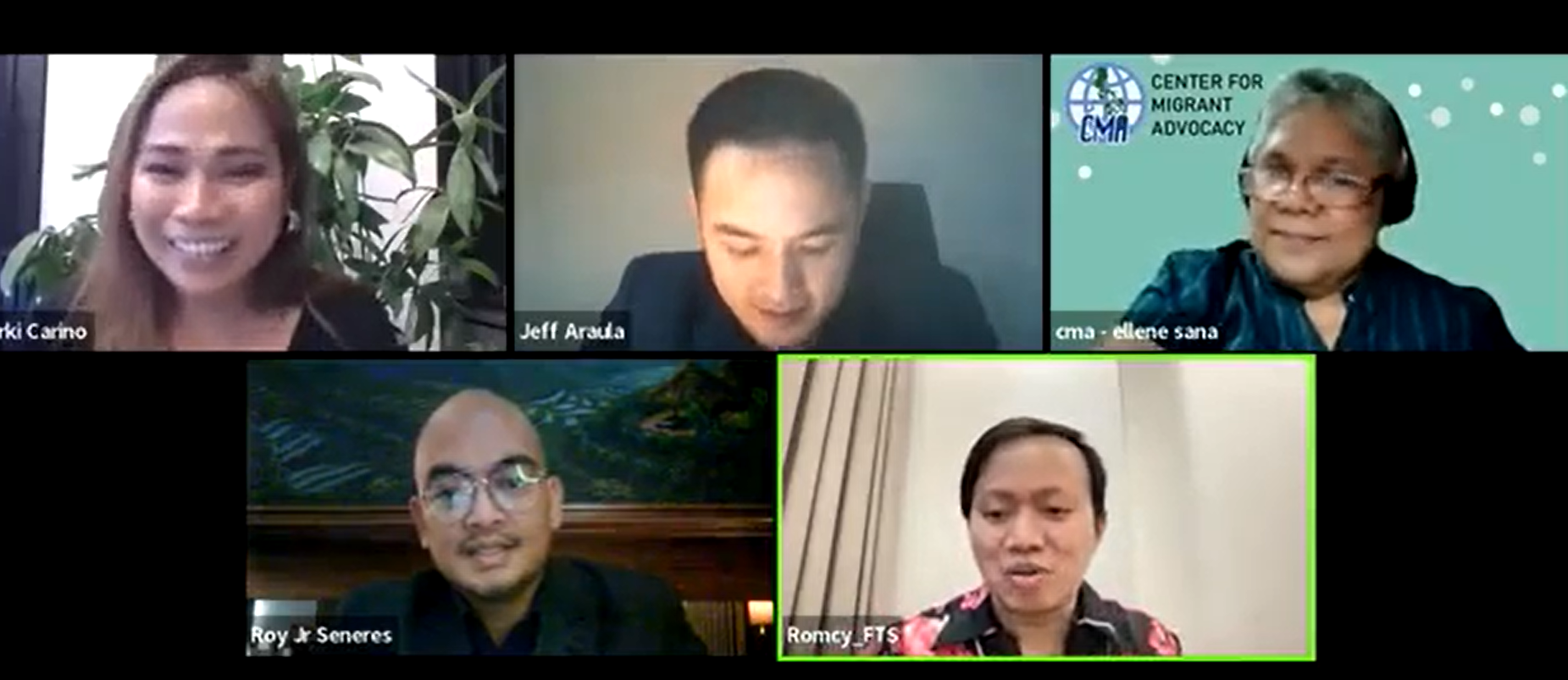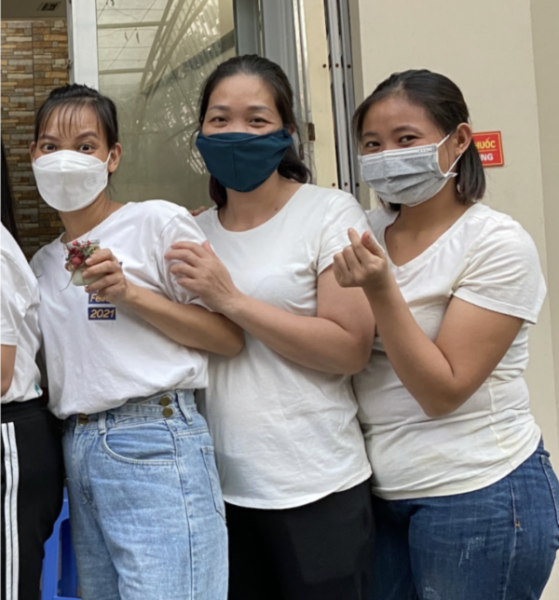Harvard historian Timothy Patrick McCarthy is a scholar of slavery. And even he didn’t know about modern slavery until he read FTS Co-founder Kevin Bales’ seminal work, Disposable People.
“I was completely blind to the reality that the things I was studying historically still existed in the present,” McCarthy says. Modern slavery hides: in supply chains, restaurants, homes, factories, farms and brothels. The faces and stories of slaves are invisible, suppressed. Experts estimate there are 40 million men, women and children enslaved globally today—more than any time in human history.
“I fight for freedom because freedom is the foundation of everything,” says McCarthy. “It is our moral responsibility to do the work of freeing those who are not.”
Teaching Modern Slavery for the First Time
In 1999 Disposable People opened McCarthy’s eyes to a brutal reality unfolding in real time—and snapped him out of the notion that slavery is over. He decided to confront this global humanitarian emergency in his teaching and by donating to FTS. In FTS he found a modern abolitionist movement uniting people from all sectors of society.
After McCarthy designed a new undergraduate course at Harvard, where he currently directs the Human Rights and Social Movements Program at the Carr Center for Human Rights Policy, he reached out to Kevin Bales. In his young course on American protest literature, McCarthy taught Disposable People, Bales guest lectured—and the class became the country’s first to include modern slavery in the curriculum.
McCarthy was deeply drawn to FTS’ mission. “It reminded me of anti-slavery societies in the 19th century. This was a modern-day abolitionist organization meeting the challenge and crisis of modern-day slavery.” On his university office door, McCarthy has a black-and-white Free the Slaves logo sticker: the fist opening the lock.
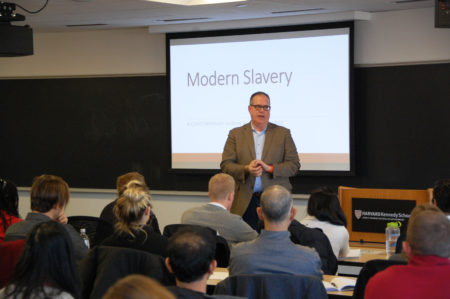
Lessons of the Past Resound Today
McCarthy teaches that the past is present. The past helps us cope and contend with the legacies of slavery, which still haunt. But, McCarthy offers, “There are so many lessons to learn from the abolitionists historically.”
Lesson One: It only takes a few passionate people to start a revolution. The abolitionist movement in America started humbly in the early 1800s with a handful of concerned citizens outraged at the injustice of slavery. “It doesn’t take a world population to change the world,” McCarthy says.
Lesson Two: A movement needs richly diverse stakeholders. Diversity gives anti-slavery work its strength and sustenance. Abolitionism became the first interracial U.S. social movement, in which men and women worked together and crossed socioeconomic lines and religious affiliations—truly the first global human rights movement. “Yearning to be free is the one thing that connects every human being on the planet,” McCarthy says.
FTS Supports ‘Freedom Ecosystem’
For many years McCarthy has been an FTS donor, advocate and board member. “Now we have a freedom ecosystem: many different organizations working in close contact to mobilize resources,” he says. “Free the Slaves has been a leader for its entire existence. [FTS] puts its money where its work is.”
Crucial donors like McCarthy support our Community-based Model for Freedom: grassroots anti-slavery advocacy in communities where slavery is most rampant. Our model is local, targeted and effective.
“FTS is an organization I believe in, whose values I’m very much aligned with, whose people I trust,” McCarthy says, “And whose work is absolutely indispensable.”
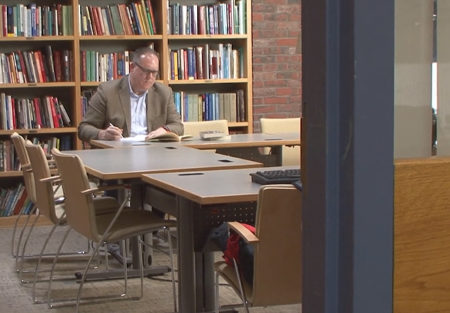
Stories Have Powerful Impact
What slavery conceals, McCarthy fights to illuminate. Abolitionists raise consciousness and change society by telling the stories of slaves striving to be free. Slave and survivor stories change hearts and minds; they are wake-up calls for freedom.
“Modern-day freedom fighters must hear and heed the stories of slavery and freedom from our brothers and sisters in bondage in this moment,” McCarthy says. “Those stories are absolutely essential. Free the Slaves is a trailblazer, showcasing the lives and struggles of people who have been enslaved, who are enslaved and who have achieved their freedom, in part with the help of [FTS].”
Stories inspire people to become freedom fighters in their own right.
Calling Policy-Makers and Poets, Media and Ministers
McCarthy life’s work is bringing historical theories to life for his students, whom he encourages to be thoughtful “boundary-crossers” and enthusiastic activists. He asks them, and himself, “Where will you be in the index of the history books?”
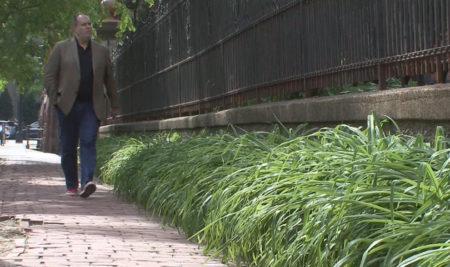
McCarthy considers himself a loving critic, confronting slavery with both analysis and resistance. His role—and work with FTS—is to build bridges between ideas and ideals, scholarship and action.
Everyone can take part. “You can have poets and writers and visual artists, media culture and journalists, ordinary citizens, young, old, everywhere in between,” McCarthy says. “Not all people standing at the founding of the abolitionist movement lived to see the day of emancipation, but many did. It was a daunting task, and they confronted it with unbelievable boldness and bravery. We have to do the same thing today.”
Out of slavery’s dark history, and shameful present, comes the light of emancipation and empowerment. McCarthy supports FTS’ crucial anti-slavery work. Will you? Your donation spreads freedom worldwide.

